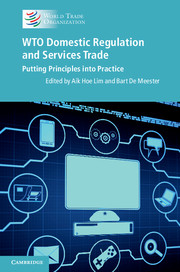Book contents
- Frontmatter
- Contents
- List of contributors
- Foreword
- Disclaimer
- Acknowledgements
- List of abbreviations
- 1 An introduction to domestic regulation and GATS
- Part I Impediments to services trade, regulatory theory and principles
- Part II Legal perspectives on WTO principles and domestic regulations
- Part III Case studies
- 8 Legal services in the United States
- 9 Telecommunications reform in China: fostering competition through state intervention
- 10 Information communications technology: the Mauritian experience of regulation and reform
- 11 Regulation of postal services in a changing market environment: lessons from Australia and elsewhere
- 12 Mobile money services provision in East Africa: the Ugandan experience
- 13 Financial services liberalization and regulation in Japan: implications for future negotiation on market access and domestic regulations
- 14 Domestic regulations in Malaysia’s higher education sector
- 15 Domestic regulations and India’s trade in health services: a study of hospital and telemedicine services
- 16 Operating integrated logistics services in a fragmented regulatory environment: what is the cost?
- 17 Domestic regulation of retail food distribution services in Israel: the missing link between food prices and social protest
- 18 Regulatory impact analysis: addressing the trade and regulatory nexus
- Part IV Concluding remarks
- Index
- References
11 - Regulation of postal services in a changing market environment: lessons from Australia and elsewhere
Published online by Cambridge University Press: 05 April 2014
- Frontmatter
- Contents
- List of contributors
- Foreword
- Disclaimer
- Acknowledgements
- List of abbreviations
- 1 An introduction to domestic regulation and GATS
- Part I Impediments to services trade, regulatory theory and principles
- Part II Legal perspectives on WTO principles and domestic regulations
- Part III Case studies
- 8 Legal services in the United States
- 9 Telecommunications reform in China: fostering competition through state intervention
- 10 Information communications technology: the Mauritian experience of regulation and reform
- 11 Regulation of postal services in a changing market environment: lessons from Australia and elsewhere
- 12 Mobile money services provision in East Africa: the Ugandan experience
- 13 Financial services liberalization and regulation in Japan: implications for future negotiation on market access and domestic regulations
- 14 Domestic regulations in Malaysia’s higher education sector
- 15 Domestic regulations and India’s trade in health services: a study of hospital and telemedicine services
- 16 Operating integrated logistics services in a fragmented regulatory environment: what is the cost?
- 17 Domestic regulation of retail food distribution services in Israel: the missing link between food prices and social protest
- 18 Regulatory impact analysis: addressing the trade and regulatory nexus
- Part IV Concluding remarks
- Index
- References
Summary
Introduction
The digital revolution and the exponential growth of the Internet have led to radical changes in the ways in which countries conduct their commerce, communicate and store information. Coupled with the digital revolution, the last several decades have also seen a fundamental rethink of the role of the state in the economy. Broadly, the past reliance in many countries on state control and regulation has given way to a greater emphasis on competition, trade openness and market forces.
This chapter, drawing from the experience in Australia and elsewhere, considers some of the key issues raised by these trends in relation to the regulation of postal services. It seeks to address the broad concern of how best to regulate by focusing on: the policy and regulatory tensions in ensuring universal service obligations (USOs) in postal markets that are, or are being, liberalized; typical competition issues arising in liberalized postal markets; as well as the appropriate role and form of regulation in such markets. In addition, the chapter examines the impact of international trade rules (in particular the WTO General Agreement on Trade in Services, GATS) on the postal sector and some of the problems arising out of the nexus that exists between trade rules and postal regulations (both domestic and international).
- Type
- Chapter
- Information
- WTO Domestic Regulation and Services TradePutting Principles into Practice, pp. 181 - 200Publisher: Cambridge University PressPrint publication year: 2014



